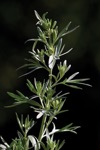| Scientific: | Artemisia absinthium |
|---|---|
| Other: | Wormwood |
| Family: | Asteraceae |
Wormwood has a long history in both herbal medicine and the liquor industry. It contains sesquiterpene lactones (absinthin) that make it extraordinarily bitter but make it ideal as a digestive tonic for various forms of indigestion. It is sometimes classified as an aromatic bitter because it also has high amounts of essential oils that impart a carminative action that relieves colic and gas. In the German herbal tradition, it is often used specifically for gallbladder disorders including biliary colic, cholestasis, and gallstones.
The infamous liquor Absinthe contains high amounts of wormwood and has been banned or altered in most western countries. Wormwoods contains high amounts of thujone, a neurotoxin that when consumed chronically in high amounts alters mood and causes mental disturbances.
As the name implies, wormwood is used as an anthelmintic and vermifuge to treat worm infestations of the gastrointestinal tract, but its antimicrobial properties are not just limited to worms. Also, research studies show it possesses antibacterial, antifungal, antiparasitic and antiviral properties, making it a useful broad-spectrum antimicrobial. Moreover, recent research has revealed it also has some anti-inflammatory properties, which may help patients who have Crohn's disease stay in remission.
Gastrointestinal
• atonic digestive complaints
• dyspepsia
• hypochlorhydria
• pancreatic insufficiency
• colic
• irritable bowel syndrome (IBS)
• Inflammatory bowel disease (IBD)
• Crohn's disease - supported by research
Hepatobiliary
• biliary insufficiency
• cholestasis
• cholelithiasis (gallstones)
• jaundice
• biliary dyskinesia
Note: other herbs are safer for long-term use.
Infection
• helminths (worms)
• roundworms)
• pinworms
• upper respiratory tract infections
Gynecological
• irregular menstrual cycles
• dysmenorrhea
• amenorrhea
Other
• IgA nephropathy
• Bitter
• Stomachic
• Cholagogue
• Choleretic
• Carminative
• Antimicrobial
• Anthelmintic
• Vermifuge
• Febrifuge
• Antiinflammatory
• Emmenagogue
• Sesquiterpene Lactones (E.g. Absinthin)
• Essential Oils
• Monoterpenes (Thujone)
• Flavonoids
• Liquid extract (1:1 in 25% EtOH): 1-4 ml tid
• Infusion (Dried herb): 1-2 tsp tid
High doses:
• May lead to nausea, vomiting, diarrhea, paralysis and convulsions
• Essential oil contains thujone, which is a neurotoxin.
Contra-Indications:
• Gastritis & stomach ulcers
• Obstructed gallbladder
Caution:
• Asteraceae allergy: contains sesquiterpene lactones
• Depression
• Epilepsy • thujone os a excitory neurotoxin
Pregnancy & Lactaction:
• Unsafe: uterine stimulant & thujone is teratogenic.
• Antiepitileptic drugs • the neurotoxin thujone present in wormwood may reduce the efficacy of medications used to prevent seizures including: lamotrigine, carbamazepine, phenobarbital, primidone, valproic acid, gabapentin, phenytoin.
Barnes J, Anderson LA, Phillipson JD. Herbal Medicines, 3rd ed. London: Pharmaceutical Press, 2007.
Bone K. Principles and Practice of Phytotherapy. Edinburgh: Churchill Livingstone, 2000.
Bone K. A Clinical Guide to Blending Liquid Herbs: Herbal Formulations for the Individual Patient. St Louis, MO: Churchill Livingstone, 2003.
Brinker F. The Toxicology of Botanical Medicines, 3rd ed. Sandy, Oregon: Eclectic Medical Publications, 2000.
Felter HW, Lloyd JU. King's American Dispensatory. 1898. http://www.ibiblio.org/herbmed/eclectic/kings/main.html. Accessed: August 19, 2006.
Hoffman D. Medical Herbalism. Rochester, Vermont: Healing Arts Press, 2003.
Weiss RF. Herbal Medicine. Beaconsfield, England: Beaconsfield Publishers Ltd, 1988.
Williamson EM, ed. Major Herbs of Ayurveda. Edinburgh: Churchill Livingstone, 2002
Disclaimer: This content is subject to change. The information is intended to inform and educate; it does not replace the medical evaluation, advice, diagnosis or treatment by a healthcare professional. www.nhpassist.com © 2014 NDAssist Inc. and/or its affiliates. All rights reserved.

|
Wormwood
SummaryWormwood has a long history in both herbal medicine and the liquor industry. It contains sesquiterpene lactones (absinthin) that make it extraordinarily bitter but make it ideal as a digestive tonic for various forms of indigestion. It is sometimes classified as an aromatic bitter because it also has high amounts of essential oils that impart a carminative action that relieves colic and gas. In the German herbal tradition, it is often used specifically for gallbladder disorders including biliary colic, cholestasis, and gallstones. IndicationsSign in requiredActionsSign in requiredConstituentsSign in requiredPosologySign in requiredSafetySign in requiredInteractionsSign in requiredReferencesSign in required |
|---|